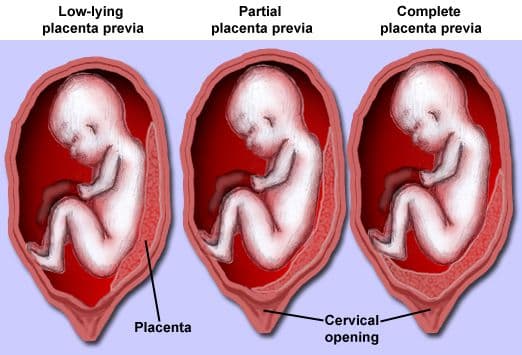What Are the Risk Factors for Placenta Previa?
Complications
Obie Editorial Team

How can I lessen my risk for placenta previa?
Placenta previa occurs when the placenta implants at or close to the cervix. In some cases, it can completely cover the cervix. Placenta previa occurs in 1 in 200 pregnancies. While the exact causes of this condition are not known there are certain lifestyle and medical factors that may put you at a higher risk for developing placenta previa.
Cigarette smoking
Smoking during pregnancy causes many health issues in the developing fetus. In addition to placenta previa and placental abruption, smoking can also cause low birth weight and premature rupture of the membranes which can result in miscarriage and premature birth.
Cocaine use
Like other illegal substances, using cocaine during pregnancy can harm your unborn baby in several ways. It can increase infertility, stimulate uterine contractions and increase the risk of prematurity, increase the risk of having a small baby (IUGR=intrauterine growth restriction) and a low birth weight baby, and cause miscarriage, placental abruption, stillbirth. It can also increase the risk of fetal malformations, and lead to fetal withdrawal symptoms, such as seizures, depression, lethargy, feeding problems, hyperactive reflexes, vomiting, diarrhea, high-pitched cry, and restlessness, as well as increase the risk of the baby having developmental problems
Age: Under 20 or over 35
Being outside the age brackets for an ideal pregnancy can up the risk so very young women under 20 and those over the age of 35 have a higher risk for developing placenta previa.
Prior pregnancies and/or multiple pregnancies
Having twins or triplets or any type of multiple pregnancy in the past is a risk factor.
Prior uterine surgery
Any kids of uterine surgery may increase your risk for placenta previa, such as a prior C-section, D&C (dilation and curettage), fibroid removal, or other types of surgery.
Prior diagnosed case
If you already have had placenta previa in a prior pregnancy, this raises your risk of another placenta previa by 2-3 percent. It is important to inform your doctor or midwife to any previous pregnancy complication so that you can both come up with a plan.
Read More









